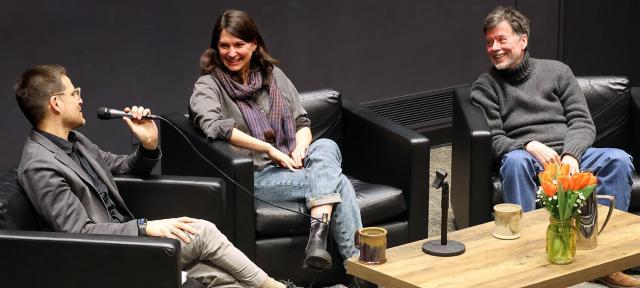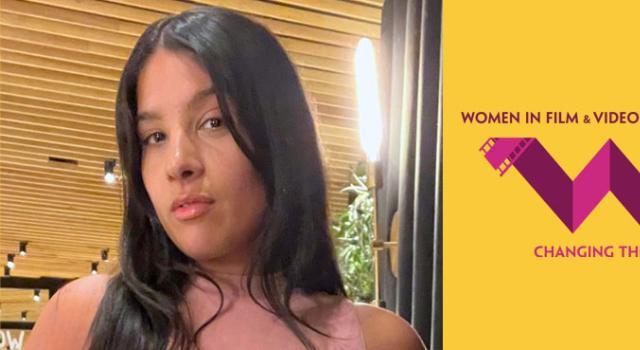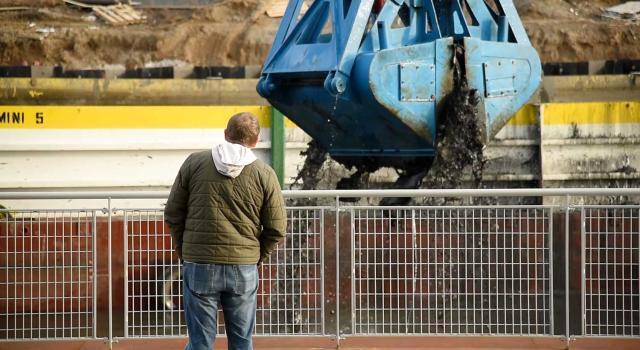Upended Worlds: An Evening with Acclaimed Filmmakers Ken Burns 71F and Kira Akerman at Hampshire College

On Thursday, March 28, students, faculty, staff, and community members filled the Main Lecture Hall for a screening and conversation with filmmaker Kira Akerman and documentarian Hampshire alum Ken Burns 71F.
Inside the lecture hall, the atmosphere was warm and anticipatory. The hum of excited conversation began to fill the room as people arrived — some traveling just steps from their mods, some from neighboring towns, some from as far away as Boston and New York.
After welcome remarks from President Ed Wingenbach, Div III student Finn Farrell F22 and Sustainability Manager Sara Draper stepped forward to share a land acknowledgment recognizing the histories and current realities of the land and the place where we gathered: “Let’s be mindful of the ongoing global impacts of colonization, enslavement, and theft of culture, land, and labor, as well as the legacies of collective resistance and cultural resilience.” Together, they rooted the audience in the moment and set the tone for an evening of conversation and storytelling about cultural and ecological change, extractivism, and the American landscape.
First up was a viewing of a portion of Akerman’s debut feature-length film Hollow Tree. The documentary, filmed in Louisiana, follows three teenagers — Annabelle (18), Mekenzie (18), and Tanielma (17) — as they grapple with the realities of climate change in their sinking homeplace. Each brings a unique perspective — as Indigenous, white, and Angolan young women — as they examine the ties between ecological changes along the Mississippi River and the realities of politics, the past, and societal power structures.
“The history of the Mississippi River is fascinating to me. The river moved so drastically for such a long time and then we held it in place — engineered it into place,” said Ackerman, describing the way levees have been built to harness the water. “And I saw that as a powerful metaphor for thinking about how our built environments dictate how we move and act in space and often in ways that we’re not conscious of.”
Speaking to the central role history plays in the film, she continued, “I was interested in working with these three wonderful young women to learn about this history, and through understanding the history of the river come to understand what was constraining their movements as young women and their possibilities or sense of agency.”
Akerman has contributed to the academic discourse on documentary practices in addressing climate change, and her works, including the short film Station 15, have been showcased at the New Orleans Film Festival, Chicago’s International Children’s Festival, and MoMA, among many other places.
Then Burns stood to address the crowd: “I'm so happy to be back at this space that I’ve visited for almost 53 years. I’ve premiered a lot of films and shared a lot of things and conversations here.”
“I'm so happy to be back at this space that I’ve visited for almost 53 years. I’ve premiered a lot of films and shared a lot of things and conversations here.”Ken Burns 71
Attendees were treated to a segment from Burns’s latest documentary work, The American Buffalo, a two-part, four-hour series that delves into the history of the American bison, its profound connection with Indigenous cultures, the species’ near extinction, and the dedicated conservation efforts behind its revival. The work represents a new frontier for Burns; it’s a project he has contemplated for more than three decades and is, notably, his first biography of an animal.
“I have lots of projects I can think of that are just sort of instantaneously engaged,” he said. “And this is one that had the curious thing of being something we were incredibly passionate about by the early ’90s but there was something that was holding us back. And I realized that when we made this film, it was exactly right that we had spent 30 years incubating it because it permitted a great deal of new scholarship to take place, and some of those baselines to shift.”
Burns’s remarkable career began at Hampshire College with his first documentary film as his Div III project. He has gone on to create a vast repertoire of award-winning historical documentaries known for their depth and narrative power, such as The U.S. and the Holocaust, Benjamin Franklin, and Muhammad Ali.
Following the screenings, Jonathan Lash–Endowed Chair Professor of Environmental Education and Sustainability Andrew S. Yang moderated a conversation and audience Q&A with the filmmakers. Burns and Akerman delved into the intricate relationship between filmmakers and their subject, the ways their films engage with the topic of environmental and cultural conservation, and what inspired them to capture stories about real life.
“I arrived at Hampshire at 18 years old and everybody who was interested in film was a social documentarian, still photographer, and filmmaker who reminded me that there is as much drama in what is and what was as in anything the human imagination dreams of,” said Burns.
The conversation touched on the importance of acknowledging and grappling with the complexities of political environments, the challenges of crafting an effective narrative, and the process of selecting images to convey their stories. Akerman and Burns talked about the painstaking but rewarding process of filmmaking, the critical role of editors, and the ever-present goal of making their work resonate with authenticity and emotional power.
“The most important thing is that I’m not interested in a point of view, in having a message,” said Burns. “I’m interested in telling a good story. Period.”
Photo by Alysha Ras F22



